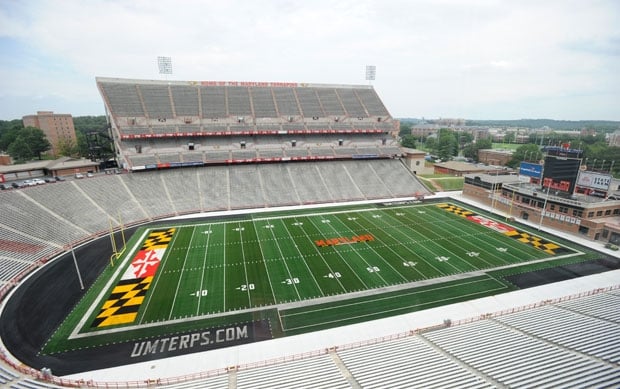You have /5 articles left.
Sign up for a free account or log in.

Maryland's Byrd Stadium.
University of Maryland at College Park
University of Maryland at College Park sports fans can work around the lack of captioning on football and basketball scoreboards by visiting a website on their portable devices that translates game announcements via text, but that may not be good enough.
The National Association of the Deaf is suing Maryland over the issue, arguing that the Americans With Disabilities Act and Rehabilitation Act obligate the university to equip its facilities with captioning technology that informs deaf attendees of plays and penalties called, safety and emergency information, and any other announcements.
“We offer accommodations that we believe are in compliance with the law,” said Brian Ullmann, Maryland’s assistant vice president of university marketing and communications, “including providing closed captioning of all game announcement through a special website accessible by any smart phone or tablet. We even offer the loan of tablets on game day for those who require one.”
But advocates and scholars of deaf studies say that approach is insufficient.
On tablets or phones, the small screen and size of text can be an issue, but the bigger problem is that you can’t sign with a device in your hand, said L. Scott Lissner, president of AHEAD: Association on Higher Education and Disability. There are also potential issues with Internet speed and connectivity in a crowded area, condition and maintenance of the device, and weather (such as glare in the sun, or rain blurring the screen).
“When it comes to communications, the ADA gives a great deal of deference to the person with the disability to determine if it is effective,” said Lissner, who is also ADA coordinator at Ohio State University, which uses news crawl-type displays under the scoreboard and along either side. “I have to say, they are appreciated by most of the crowd.”
Maryland might be wise to follow Ohio State’s lead; the NAD sued that institution, too, in 2009. The following year, as part of a settlement agreement, the university installed the crawls. The NAD has filed similar lawsuits against the University of Kentucky and the Washington Redskins.
However, Lissner noted that the federal laws Maryland is accused of violating do allow for interpretation of what constitutes “effective” (in the case of private colleges under Title III of the ADA) and “equally effective” (for public institutions under Title II) communications aids and services. Because the laws make no technical or specific requirements beyond that, Maryland may have some discretion in determining what is sufficient.
But the purpose of ADA is “to integrate individuals with disability into society,” noted Michael Stein, a partner at the law firm Stein & Vargas and lecturer at Rochester Institute of Technology’s National Technical Institute for the Deaf.
“If the University of Maryland considered information important enough to project over the public address system or on its website, then it must also make that information accessible to individuals who are deaf or hard of hearing,” Stein said in an e-mail. “That is what equal access requires.”
Howard A. Rosenblum, CEO of the association for the deaf, said that his organization and the law firm that’s suing the university on behalf of two (non-student) Maryland fans have been discussing the issue with the university “since the beginning of the year” -- but that one NAD official first complained about the lack of captioning in 2007.
Maryland upgraded its football stadium and replaced its scoreboards in 2009, “making it one of the top collegiate facilities in the country,” its athletics website says. And Rosenblum notes that the university does provide captioning on the basketball arena scoreboard during graduation ceremonies.
“This lawsuit and others like it are emblematic of the fact that, decades after comprehensive federal legislation was passed, people with disabilities are still fighting for the right to live in the world,” Rosenblum said in an e-mail. “Here, we’re fighting for the right to enjoy college athletics – a quintessential American pastime – on equal footing with everybody else.”
And Maryland is not unique. The NAD is looking into how campuses nationwide accommodate the deaf at sporting events, but Rosenblum believes “most universities do not provide communication access for their deaf and hard of hearing fans.”
While acknowledging a lack of hard data, Lissner said he’s gotten a similar impression.
“Many institutions have not put a reliable process in place, so I suspect they have not invested in handheld devices or other alternatives,” he said.




